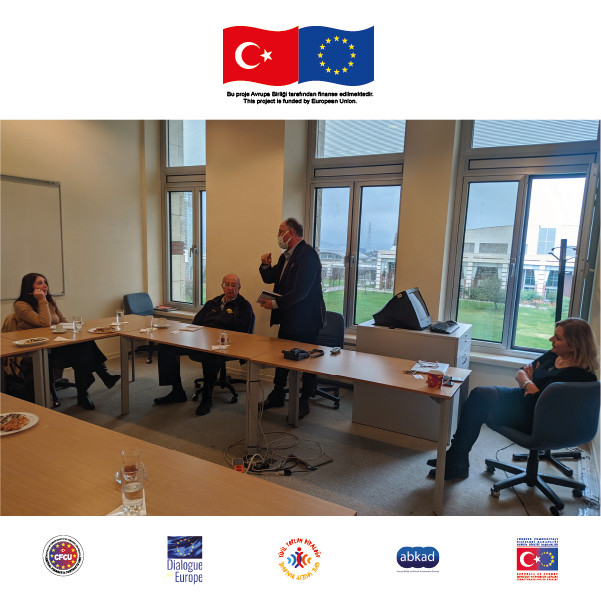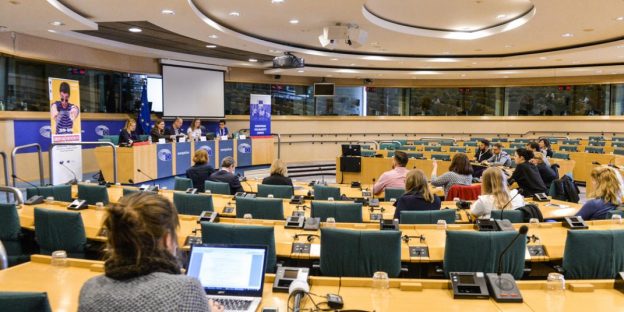Dialogue Europe Institute News –
Scientific Tasks
- Development of the research potential of Sofia University St. Kliment Ohridski within the joint work of a team of distinguished teachers, young researchers and experts from Sofia University, Bulgarian Academy of Science (BAS), state institutions, business, and the NGO sector;
- Implementation of a 7-year academic programme with clearly formulated and specific research goals related to the public practice under the general motto „Dialogue Europe”;
- Setting up of a model of work and promotion of research initiatives of young scholars through projects, publications of their works, scholarships, specializations, training seminars – modules etc.;
- Further development of the doctoral and postdoctoral institute in Sofia University and at the same time providing support for the development of “human resources” division and “international activity” division in the administration;
- Harmonization of the Bulgarian social environment with the one in European Union and promotion of regional cooperation in the academic research field.

Consortium Partners
- Sofia University “St.Kliment Ohridski”
- Bulgarian-American Commission for Educational Exchange (Bulgarian Fulbright Commission)
The Bulgarian-American Commission for Educational Exchange (Bulgarian Fulbright Commission) was officially inaugurated on February 9, 1993, under a ten-year bilateral agreement between the Governments of the United States and the Republic of Bulgaria. On December 3, 2003, a new bilateral agreement was signed between the Governments of the United States and the Republic of Bulgaria establishing the Fulbright Commission in perpetuity.
The main function of the Commission directly derives from the goals of the Fulbright Program worldwide and consists in administering the exchange of Bulgarian and American scholars, students, teachers, school administrators and professionals and disseminating information about opportunities for study, research, teaching and lecturing in the U.S.
Educational advising is another major activity of the Commission that has dramatically expanded since the opening of the Advising Center in 1994. The Center offers ample information and guidance on educational opportunities in the US, admission procedures at US universities, financial aid, paper-based and computer-based testing, language training, the annual Fulbright and other competitions etc. There are regular individual and group sessions from Monday through Friday. Annually, the center services about 17,000 visitors, email and phone inquirers.
In 1995 the Commission established its Language Training Center in Sofia which offers English language instruction at all levels and preparation for the American standardized tests iBT TOEFL, SAT, GRE, GMAT and business English. Annually, the Language Center trains over 500 students.
Every two years since 1994 the Bulgarian Fulbright Commission organizes international Fulbright conferences on key issues relating to education, culture, knowledge and the growth of civil society.
Every year since 2002 the Commission organizes a two-week Fulbright International Summer Institute. FISI offers one and two-week interdisciplinary courses in a variety of fields: political science and international relations, social studies, economics and business, education and communication, cultural studies, etc. The courses are addressed to undergraduate and graduate students and junior faculty from all over the world.
The Bulgarian Fulbright Commission has opened twelve local information centers in the cities of Plovdiv, Burgas, Veliko Turnovo, Rousse, Stara Zagora, Varna, Sliven, Smolyan, Vidin, Shumen, Kurdzhaly and Madan.
The Ambassador of the United States to the Republic of Bulgaria and the Minister of Education and Science of the Republic of Bulgaria serve as honorary chairpersons of the Commission. Assoc. Prof. Dr. Julia Stefanova is the Executive Director of the Fulbright Commission.

- State Commission on Information Security
The State Commission on Information Security (SCIS) is the government authority, which conducts the classified information protection policy of the Republic of Bulgaria. The basic aspects of the SCIS activities are related to the organization, coordination and control over the classified information protection. In order to implement these duties the SCIS performs the following tasks:
- Provides general direction of the activities relating to the background vetting of the persons who require to operate with classified information and relating to the issuance of the appropriate levels of clearances for access to classified information;
- Provides general direction of the activities relating to the background vetting of natural or legal persons proposing to enter or performing a contract which involves access to classified information;
- Jointly with the security services conducts background vetting of, and subject to the advice of such services, issues clearance to persons nominated for appointment as information security officers;
- Issues certificates confirming before such foreign authorities as it may concern that Bulgarian natural or legal persons have been issued clearance or certificate, as the case may be;
- Jointly with the security services, conducts background vetting of Bulgarian citizens who apply for a position or for the performance of a special assignment which require such citizens to operate with the classified information of another state or an international organization;
- Maintains single registers of clearances, certificates, certifying or confirming documents issued, revoked or terminated, and of refusal to issue or terminate such papers, and a register of materials and documents which contain classified information, such information being a state or an official secret;
- Organizes and coordinates the training for operation with classified information;
- Provides methodological guidance to information security officers;
- Exercises general control over the protection of classified information as is stored, processed or transmitted by automated information systems or networks;
- Develops guidelines and approves action plans for organizational units in the event of a threat to the state interests resulting from unauthorized access to classified information;
- Analyses and assesses the state of preparedness for the protection of classified information in the event of a threat to any interests protected by law resulting from unauthorized access to classified information and issues mandatory instructions in that area;
- Advises immediately the Prime Minister in the event of unauthorized access to information classified as TOP SECRET;
- Organizes and performs activities to prevent and mitigate the harmful consequences of unauthorized access to classified information;
- Drafts and introduces before the Council of Ministers for adoption statutory instruments relating to the classified information protection;
- Organizes, controls and is responsible for the performance of obligations relating to the protection of classified information as laid down in international treaties to which the Republic of Bulgaria is a party;
- Organizes and ensures the functioning of registries in the field of international relations;
- Issues visit permits to persons performing inspections in pursuance of international treaties relating to the mutual protection of classified information.
For the implementation of the above mentioned tasks the Commission works in close collaboration with the authorities of the Ministry of Defence, Ministry of Interior, Ministry of Foreign Affairs and with the security and public order services.
In accordance with Art. 6, Para 1 of the Classified Information Protection Act, the State Commission on Information Security is a collegiate body comprising five members, including a chairperson and a vice-chairperson. Members of the Commission are nominated by the Council of Ministers on the advice of the Prime Minister. Since 2002 Mrs. Tsveta Markova is chairperson of the State Commission on Information Security.
- National Branch Trade Union “Higher Education and Science”
National Branch Trade Union “Higher Education and Science” established at June 29, 2001 has sections in 30 universities, academies, institutes and collages. NBS HES is a member of the Confederation of the Independent Trade Unions in Bulgaria (CITUB). CITUB on the other hand is a member of the International Confederation of the Free Trade-Unions and the European Confederation of the Trade-Unions.
Among its main purposes are:
- Concerning employment, payment, social insurances and living standard the Syndicate defenses the labor stands and representation of it member’s rights at the State Institutions.
- Maintenance of the social gains of people working in the Universities and the Bulgarian Academy of Sciences (BAS), forcing of social dialog and Collective Labor Contracts (CLC).
- Consolidation of the syndicate structures, enhance motivation for membership in these structures.
- Solidarity relationships between the basic syndicate organizations and their integration into the national and international trade-union movement.
- Representation the syndicate members at branch and national level, improvement of the social dialog with managers of the Universities and BAS.
- Expertise information and teaching of the syndicate know-how.
President: Assoc.Prof.Dr. Eng.Lilliana Valcheva

- Institute of Geography at the Bulgarian Academy of Sciences
Founded in 1950 the Institute of Geography strives to provide scientific services to the national, regional, and municipal governments of Bulgaria in the fields of sustainable regional development, nature protection, and raising the quality of geographic education.
The Institute of Geography takes responsibility for the fundamental national research priorities with the goal of raising the competitivness and the sustainable development of the national economy in conditions of globalization and Euro-integration, as well as to preserve Bulgarian nature and the cultural identity of the Bulgarian people.
The Institute’s scientific and popular science publications and educational materials provides geographic information about Bulgaria and the world and seeks to engage the public with Global Change problems and global values in all spheres of human life.
There are 43 staff members at the Institute of Geography, 28 of which are Research Fellows. Two of them have “Doctor of Sciences” degrees, while 19 have PhD degrees. Fifteen Research Fellows are tenured and there are eight specialists with a MA in Geography. The Institute has Section on Physical Geography and Section on Economic and Social Geography. There is also a recently established Geo-information Center. The main programs of scientific research and activity include global changes and environmental protection, regional development, European integration and transboundary cooperation, education and training.
In 2008 the Institute became a member of the European Network for University Geographical Education HERODOT. The Institute participates in many national and international projects.
Senior research fellow Dr. Mariana Nikolova is Director of the Institute of Geography at Bulgarian Academy of Science.
- Ministry of Foreign Affairs of Bulgaria, Department of Chancellery and Archive
